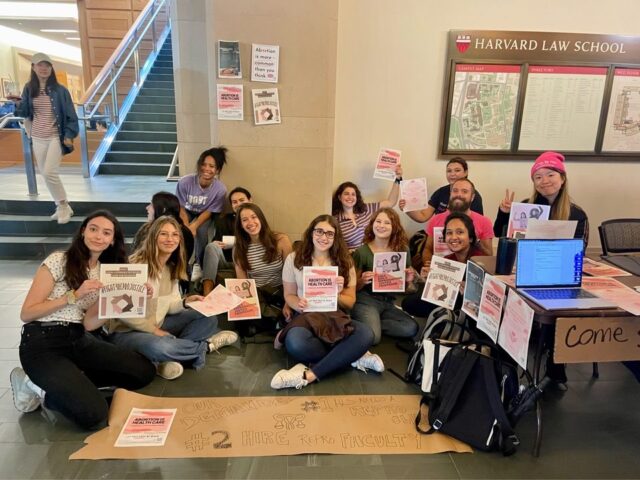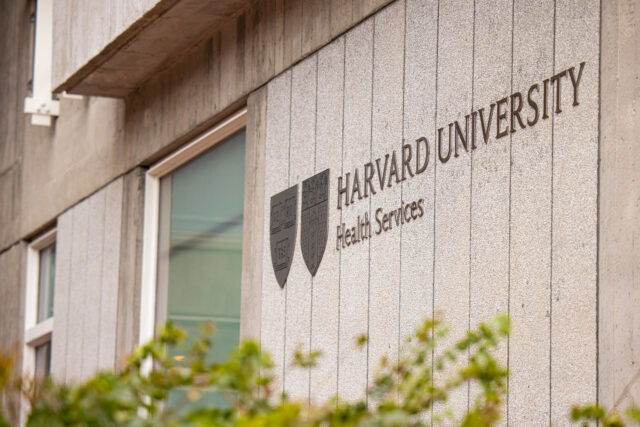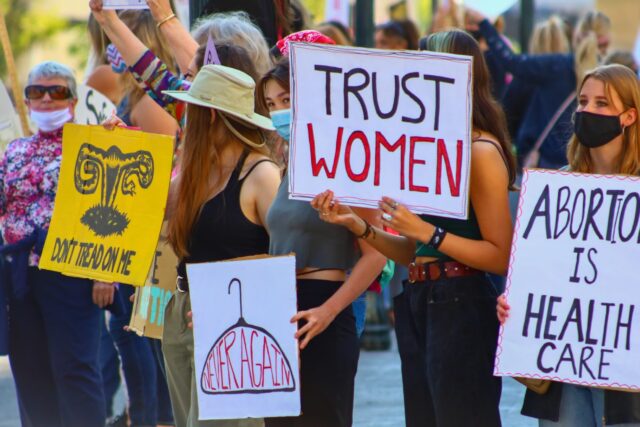Reproductive Access at Harvard
Harvard Law Student
March 11, 2024
On June 24, 2022, two Harvard alumni joined the majority opinion of Dobbs v. Jackson Women’s Health Organization and overturned Roe v. Wade—the 1973 historic decision that legalized abortion across the United States. Just a few hours after the Dobbs opinion was released, Harvard University Health Services released a brief press release entitled, “Reproductive Care and Services Are Still Available at HUHS.” In it, Harvard University said:
“Harvard University Health Services is committed to providing comprehensive and quality reproductive care and services. These services include discussing all available options that will assist our patients with making their own safe and informed decisions and as necessary providing referrals to resources outside of HUHS.”
Notably, the fact that Harvard students cannot access abortion services (including medication abortion) via on-campus healthcare providers was conveniently omitted from this statement.
Rather than stating this reality outright in its three-sentence press release (its use of “Still Available” and “comprehensive and quality reproductive care” seems to be…pushing it), Harvard valued virtue-signaling over veritas.
The lack of clear communication compounds concerns around abortion access. As this piece will cover, some Harvard University Health Service patients (including those who are dedicated advocates around issues of reproductive justice) report remaining ill-informed about what reproductive healthcare resources are available to them. Such confusion leaves Harvard students unsure what they can expect from their healthcare provider (perhaps the only one they will know while in Cambridge); yet, thanks to changes in federal law, people seeking services are more reliant on individual policies set by their employers, providers, and insurance carriers now more than ever.
Corporate Capture of Reproductive Justice
In the weeks after Dobbs, activists, lawyers, and doctors immediately sprang into action in hopes of mitigating the fall-out. As observed by the Chief Justice’s former law review, “Into the breach also came an unexpected ally: several corporations who pledged to offer employees seeking to terminate pregnancies a few thousand dollars in abortion-related travel assistance.”
To be sure, it was more than just several corporations that announced their intentions to provide stop-gap access for their employees. Researchers have noted that, less than a week after Dobbs, more than 110 corporations announced policies designed to supplement employees’ access to abortion. Corporations ranging from Dick’s Sporting Goods to Disney to Amazon released clear statements affirmatively stating their policies that promote abortion access for their employees.
Yet, advocates of reproductive justice do not universally regard these policies as unproblematic. As an article in the Harvard Law Review argues, “Access to abortion should not depend on which corporation someone works for. Americans cannot rely on corporations to do the work of providing workarounds and options for reproductive care.” Commentators expressed their skepticism whether corporations’ sudden interest in reproductive justice stemmed from sincere beliefs in bodily autonomy or interests in maintaining a positive brand and reputation. Others have noted the irony inherent in corporations speaking out against abortion restrictions because it might impact their recruiting efforts while simultaneously donating to candidates who support such restrictions.
Despite the uncertain sincerity of corporations’ commitment to reproductive justice, the fact remains that many employees (those who live in abortion-protected states and those who do not) are reliant upon their employers’ policies to help them pay for, travel to, and recover from health issues.
These themes of corporate reliance resonate within the higher education space as well. Like employees relying upon their employers, students rely upon their education institutions (mainly non-profit corporations) for health care. Within the Commonwealth of Massachusetts, this reliance is in fact mandated by state regulation as institutions of higher education are required to offer a student health insurance plan which students must enroll in or provide proof of comparable coverage.
Yet while some for-profit corporations scrambled to expand and publicize their abortion policies, students at one of the world’s oldest non-profit corporations, Harvard University, remain uncertain of their reproductive health options.
Mixed messaging: How Harvard’s Official Communications Protect its Brand, Rather than Students’ Wellbeing
In the days following the Dobbs decision, third-year law student Hannah Finnie authored an op-ed in the Harvard Law Record, the school’s student newspaper. Finnie emphasized the critical impact that Dobbs had on Harvard students’ healthcare. “And yet,” Finnie reflected, “the HLS administration has treated the overturning of Roe v. Wade and the constitutional right to an abortion as nothing more than an intellectual exercise. But for us HLS students, this is no intellectual exercise – it is a devastating attack and loss of our rights to health care and bodily autonomy.”
The Monday after Dobbs, Harvard Law School administrators sent an email to the entire student body—their first communication since the ruling. Noting the importance of the decision for millions, the HLS email did not offer any reassurance of continued care, including for those students who, as it was summer break, might have been working in states that had suddenly restricted abortion access. Finnie, in her op-ed, found the communication insufficient.
“Many of us turn to Harvard University Services for our health care needs or rely on Harvard’s student health plan for insurance coverage,” Finnie wrote. “Which is why it is even more upsetting that the email that Harvard Law did eventually send out had nothing to do with how our access to health care will affected by this decision, but instead, centered on a high-level panel it organized about the decision.”
“And yet,” Finnie reflected, “the HLS administration has treated the overturning of Roe v. Wade and the constitutional right to an abortion as nothing more than an intellectual exercise. But for us HLS students, this is no intellectual exercise – it is a devastating attack and loss of our rights to health care and bodily autonomy.”
This trend, of publicizing Harvard intelligentsia’s perspectives on reproductive justice while averting discussion of Harvard’s own abortion access, has permeated throughout the University. For example, the Harvard Gazette, Harvard University’s official news website, published more than 15 pieces about abortion within the past year alone.
Harvard’s promotion of abortion-related content has not been limited to written articles. Days after Dobbs, Harvard Law School hosted a panel analyzing the decision from a legal perspective.
Weeks later, the Harvard T.H. Chan School of Public Health hosted a webinar called “After Roe: What’s next for abortion access, law, and politics”; and months later, the Harvard Radcliffe Institute held a multi-day conference called “The Age of Roe: The Past, Present, and Future of Abortion in America.” Still, there have not been reports of HUHS hosting events or Q&A sessions about students’ access to reproductive health.
Finally, Harvard University offered various courses in the 2022-2023 academic year about reproductive justice and abortion related topics across Harvard College, Harvard Medical School, the Harvard T.H. Chan School of Public Health, and Harvard Law School. It is clear, however, that students are looking for more outlets to learn about reproductive justice. This past year, students affiliated with HLS’s Alliance for Reproductive Justice petitioned and protested Harvard with the goal of increasing access to reproductive justice classes, clinics, and faculty. In the spring of 2023, HLS appeared to partly acquiesce to student demand with promises of new clinical programming.
Yet despite increasing investment from across the university to discuss abortion from ethical, legal, sociological, and medical perspectives—communication about what Harvard students can expect from Harvard, their healthcare provider, has been insufficient. Harvard’s communication efforts indicate that the university has favored promoting its brand as a knowledgeable institution within a progressive state over fulfilling its obligations to adequately inform the students in its charge about expected care. This choice connects back to corporations’ social responsibility efforts to boost its reproductive health policies and publicity post-Dobbs to maintain public favor and relevance. Unfortunately for Harvard’s students, positive brand and news coverage alone cannot assuage their questions and concerns over their access to reproductive health, including abortion.

Harvard Law School at a sit-in for a full-time reproductive justice professor and reproductive justice clinic. Photo Credits: Vandana Apte
Harvard Students Remain Confused About Their Reproductive Healthcare Options and Must Rely on Student Led Efforts for Information
Anouska Chander, a Harvard College junior, founded the College’s Reproductive Justice Collective. Along with creating a non-partisan environment for students to discuss issues related to reproductive justice, one of the Collective’s first goals is to work with HUHS to increase the knowledge of care among the undergraduate populations.
Chander speaks favorably about the care that she has received at HUHS, but she acknowledges that there is still work to be done regarding transparency about campus abortion access. “All genders need sexual health knowledge and knowledge of how to be empowered to go after those services,” she says. During our interview, Chander pulled up HUHS’s website. “It is very unclear,” she observes. “There’s not even a resource guiding students towards getting an abortion.” “The lack of abortion being mentioned on their website as something that is an option for students here leaves students without a way to turn when HUHS isn’t providing abortion. How do you know where to get one?”
It seems baffling that the best resource on reproductive health at Harvard is student-produced. A nonprofit corporation with enough money to create its own self-sufficient COVID-19 testing site—at one point processing more than 50,000 COVID tests per day—leaves it to undergrads to inform each other of crucial abortion resources. Or, put more accurately, the lack of such resources.
Originally created in 2008 by Harvard undergraduate workers at the Harvard College Women’ Center, the “Sex, Health, & Reproductive Care” brochure is a well-designed and extensive resource available both online and in print. (Although, if you want a print copy, you’ll have to head down to the basement corner of a college freshman dorm to pick it up.) The report provides detailed explanations of available sexual and reproductive health resources for Harvard undergrads, including flow charts to help students facing positive pregnancy and STI tests. And finally, on page 20, it provides a clear explanation of Harvard College students’ access to abortion. Unlike the HUHS website, this student-produced resource makes clear what is often made murky: “abortions are not currently performed at HUHS.”
Unlike the HUHS website, this student-produced resource makes clear what is often made murky: “abortions are not currently performed at HUHS.”
While at least some undergraduates may be aware of the resource, other undergraduate and graduate students are still left in the dark. Vandana Apte, a member of the Harvard Law School class of 2023 and former Co-President of its Alliance for Reproductive Justice (ARJ), calls the discrepancy between Harvard’s communication about its reproductive justice programming compared to its communication about its own abortion policies as a healthcare provider hilariously ironic.
Apte has observed Harvard experts lamenting the lack of abortion access in states such as Alabama. Yet, according to Apte, “There’s not a lot of acknowledgement of that fact that Harvard Law School students also do not have this access in their own institution which is something that many people aren’t really aware of.” “Until recently, to be honest,” Apte adds, “it hasn’t been on ARJ’s radar.”
Apte, having recently planned ARJ’s annual reproductive justice conference at Harvard Law School, admits that that she would be at a loss in referring students for abortion services resources at Harvard. “I wouldn’t know what to tell them even now, and I’ve been doing this advocacy work for so long.” “That’s the ridiculous thing,” she reflects.
Unfortunately, Harvard Law School’s Dean of Students’ website isn’t much help in this matter.
To be sure, the HLS Parenting website discusses health insurance and accommodations available to students who wish to continue their pregnancies. Such accommodations include an offer to “audio record classes up to two weeks following the birth of a child and/or provide note-takers for missed classes,” permission to take breaks during exams if one is due around exam period, and nursing room access.
Notably, this page does not mention resources available for students who may elect to not continue with pregnancies or how Harvard Law School might support students who may elect such a choice. Unfortunately, resources like “Campus Life 101,” “Campus Health Guidance” and “The Well” fail to include a link to the “Sex, Health & Reproductive Care” report or reference to the material it contains.
Without providing clear guidance about reproductive health support on its websites, Harvard accordingly places the onus on students to reach out to their deans, administrators, or fellow students for information about this crucial component of healthcare. Experts have observed that employees are reluctant to reach out to their employers about accessing abortion benefits due to privacy concerns and abortion-related stigma; one wonders if a similar effect is happening within the Harvard student body.

Harvard University Health Services’s Smith Center Campus Clinic Photo Credits: Shuttershock
A Puzzle-Piece Provider: Harvard University Health Services’ Complicated Reproductive Care
Upon orientation, Harvard University students familiarize themselves with health care options on campus. First, there’s the student health fee, which is required for all registered students who are enrolled more than half-time in Massachusetts. For the 2023-2024 academic year, it is expected to be $1,408 for the full term. With the student health fee, students may receive on-campus or telehealth services like primary care, x-ray/ultrasound scans, some surgery services, neurology care, dermatology care, and even podiatry care without a co-pay. However, if students seek to access onsite OB-GYN care, they are only able to do so through their separate health insurance plan.
On-site OBGYN services include family planning services, preventive care including endometriosis (impacting at least 11% of women or people assigned female at birth worldwide, fibroids (impacting an estimated 20-50% of people of reproductive age with uteruses) and pregnancy care. But again, in order to access these services (which do not include abortion-care), students must have their own separate insurance (which includes their own separate payment policies) on top of the Harvard student health fee. For 2023-2024 year, the Harvard student health insurance plan is estimated to be $4,210 for the full term.
Put together, this means that a student might pay more than $5,000 in Harvard health related fees and still be required to pay for (off-campus) abortion services even though other services such as dermatology and podiatry would require no additional fees and are available on campus.
In the fall of 2022, Harvard student organizers, calling this policy scheme “particularly flagrant,” wrote an open letter to Harvard University Health Services asking for increased abortion services for students. In part, the letter stated:
“As greater revenue is needed to provide this additional coverage, we ask that the university allocate necessary portions of the annual distribution from the endowment to do so. We explicitly ask that the Student Health Fee not be raised as the entire point of expanding this coverage is that it is essential and should not put a cost burden, beyond the existing Student Health Fee, on students. If Harvard is to be an example for academia and the country, then it is critical to take this step and to make accessible the reproductive care of abortions to all students so that they may continue their educational journey.”
As reported in the Harvard Crimson, HUHS had received the letter but declined to comment.
Similarly, Dr. Giang Nguyen, the HUHS Executive Director, was unavailable for an interview for this piece about HUHS’s abortion-related services. Instead, a spokesperson provided the following statement on the subject:
“Harvard University Health Services (HUHS) is committed to providing comprehensive, high quality, and affordable reproductive care and services to our community.
As part of this care, abortion services are covered through our student health insurance and, if students have waived this coverage, the student health fee provides a benefit for this care. Abortion services are referred to outside practices as it requires closer monitoring and specialty care that is better provided in a practice dedicated to safely administering all manner of reproductive health care.
We believe health care decisions should remain between the patient and their health care provider. HUHS will continue to assist our patients in making their own safe and informed decisions and, as necessary, provide referrals to needed resources.”
It appears that Harvard’s abortion “services” merely include referrals and a $350 benefit (via its $4,210 a year health insurance)—available only for one of two providers when referred by HUHS.
In addition, HUHS clearly characterizes abortion as specialized care even though HUHS has an extensive internal medicine team, an onsite OB-GYN team, and onsite X-Ray and ultrasound machines.
It appears that Harvard’s abortion “services” merely include referrals and a $350 benefit (via its $4,210 a year health insurance)—available only for one of two providers when referred by HUHS.
However, Miriam Singer, a fourth-year Harvard medical student and reproductive rights advocate, states that abortion care, including medication abortion, should be considered basic reproductive health care rather than a specialty service.
“As I mention in my article,” she says, “medication abortion can safely and effectively be provided by primary care providers including family medicine physicians, internists, and nurse practitioners.” Singer also notes how “the provision of medication abortion continues to be siloed out from other basic health care services and relegated to stand-alone clinics, which contributes to stigma surrounding abortion and greatly reduces access to abortion care.”
Expansion of Abortion Access Across Campuses
Recent research about abortion access within Massachusetts public universities supports Singer’s observation. Reproductive rights’ expert and Smith College Professor Carrie Baker wanted to understand the burden placed on students not having abortion access in public university health services. Her research found that Massachusetts public university students looking to access abortion experience travel times on public transportation to reach the nearest abortion-providing facility taking between 18 and 400 hundred minutes, with a population-weighted average of 103 minutes.
Baker emphasizes how forcing students, especially those who attend rural universities and colleges, to go off campus for care creates economic, racial, and gender justice inequities. “People who are most affected and affected negatively by pushing this care off campus are women, who are disproportionately the ones who get pregnant, low-income students who can’t afford to take a day off to travel long distances to get this care, and students of color who are disproportionately low-income students.”
In response to this burden, Carrie Baker worked with her local State Representative Lindsay Sabadosa to pass legislation in August of 2022 to increase mediation abortion availability within Massachusetts public colleges, universities, and community colleges. Sabadosa reflects, “We think that we have really great access in the state until you go to get services and then you realize that it’s not true. There are good protections. If you are looped in with your doctor, and you know how to navigate the healthcare system, then you’re going to be fine. That’s not true for most people though, and college students in particular who are coming from other states.”
Now thanks to the new law, public universities are required to develop a medication abortion readiness plan for its students. The plan will consider how to directly provide medication abortions to students in a health center or how to refer them off campus, while considering the convenience and cost of public transportation. Additional changes include grants to public universities to enable them to purchase equipment for the use of medication abortions, facility and security upgrades, and costs associated with enabling the health center (including training costs).
“People who are most affected and affected negatively by pushing this care off campus are women, who are disproportionately the ones who get pregnant, low-income students who can’t afford to take a day off to travel long distances to get this care, and students of color who are disproportionately low-income students.”
However, the new law will not be directly applicable to private universities and their students. Still, State Representative Sabadosa hopes that the resources produced by the Department of Health will help medical professionals at private universities perform medication abortions on campus. “Medical professionals deal with a lot of liability issues, and so there are concerns. Now we as the state are trying to step up and say, ‘Ok, this is how you do it,’” Sabadosa explains.
Increased Access Within Higher Education
Despite Harvard’s self-aggrandizement as a uniquely elite institution, when it comes to its status as a non-abortion provider, it is all too typical. Recent reports estimate that 91 percent of higher education institutions do not offer onsite abortion access.
However, amid rising threats to abortion nationwide, New York has recently joined California and Massachusetts in efforts to provide on-site medication abortion on public universities’ campuses.
Private universities are also starting to increase access to abortion. In October of 2022, Barnard College announced its plans to offer onsite medication abortion by fall 2023. In its press release, Barnard College cited how the “overturning of Roe v. Wade after 50 years will likely decrease college accessibility, result in lower graduation rates, and derail employment trajectories.” The College added: “It is expected that people of color and those with limited incomes will be disproportionately harmed.”







